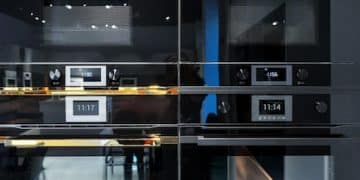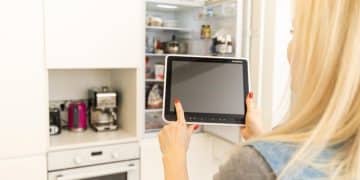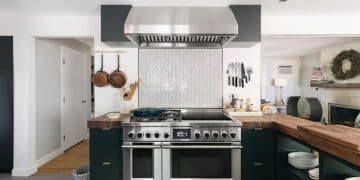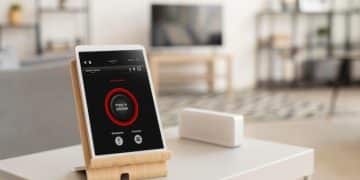Tips for setting up a connected smart kitchen

Setting up a connected smart kitchen involves integrating essential devices like smart ovens, voice assistants, and automation tools to enhance cooking efficiency and create a seamless culinary experience.
Tips for setting up a connected smart kitchen can make your culinary adventures more enjoyable and efficient. Have you ever wondered how technology can simplify meal prep? Let’s dive into some practical insights!
Understanding the basics of a smart kitchen
Understanding the basics of a smart kitchen is the first step toward transforming your cooking routine. What does a smart kitchen entail? It goes beyond just having fancy gadgets; it means creating a cohesive system where technology works seamlessly to enhance your culinary experience.
At its core, a smart kitchen is equipped with devices that can connect to the internet. This allows them to communicate with each other and with you. For instance, smart refrigerators can track your food inventory, while smart ovens can be controlled remotely. This connectivity not only adds convenience but also helps you save time and effort.
Key Components of a Smart Kitchen
To build a fully functional smart kitchen, consider including:
- Smart Appliances: Devices like smart ovens and refrigerators.
- Voice Assistants: Tools like Amazon Alexa or Google Assistant to control your kitchen devices.
- IoT Devices: Sensors that monitor temperatures and humidity.
- Smart Lighting: Adjustable lights that can create the perfect ambiance.
By integrating these components, your kitchen can adapt to your cooking needs. Imagine having a coffee maker that starts brewing as soon as you wake up, or an oven that preheats while you chop vegetables. Such conveniences can significantly improve your efficiency.
The Benefits of Smart Technologies
The benefits of having a smart kitchen are numerous. Not only does it make daily tasks easier, but it also promotes energy efficiency. Smart devices can optimize energy usage based on your habits. For example, a smart thermostat can learn when you’re home and adjust the heating or cooling accordingly.
Moreover, a smart kitchen often increases safety. Equipment can provide alerts if something is left on, reducing the risk of accidents. It allows you to focus more on preparing meals without worrying about constantly checking on your devices.
As you explore the benefits and features of a smart kitchen, remember that it’s about enhancing your experience. Whether you are a novice cook or an experienced chef, incorporating smart technology can simplify your routine and elevate your culinary skills.
Essential devices for a connected cooking space

Essential devices for a connected cooking space make cooking easier and more enjoyable. By choosing the right gadgets, you can streamline your kitchen activities. Imagine cooking without constantly checking timers or measuring ingredients. These devices bring the kitchen into the modern age.
First, consider the smart oven. This appliance can be controlled remotely via your smartphone. You can preheat your oven or adjust cooking times without being in the kitchen. Many smart ovens have preset cooking modes for various dishes, making meal preparation easier.
Must-Have Smart Kitchen Devices
In addition to smart ovens, here are other essential devices you might want to include:
- Smart Refrigerator: Tracks your inventory and helps you know when you need to restock.
- Smart Thermometer: Monitors your food’s temperature in real-time, ensuring perfect results every time.
- Smart Slow Cooker: Allows you to control cooking times and temperatures remotely.
- Voice Assistant: Provides hands-free help with recipes, timers, and even shopping lists.
The integration of these devices into your cooking space offers several advantages. For example, a smart refrigerator can send notifications about expiring items, helping you reduce food waste. Meanwhile, the smart thermometer helps prevent overcooking meat by alerting you when the right temperature is reached.
Furthermore, smart lighting can enhance your cooking experience. You can adjust the brightness based on your mood or time of day. Imagine cooking dinner with soft lighting in the evening to create a warm atmosphere.
No matter your cooking style, adding these essential devices creates a connected cooking space that caters to your needs. Each appliance plays a vital role in creating a more efficient, enjoyable kitchen experience. As you explore these devices, think about which ones will work best for your home and cooking habits.
Integrating voice assistants into your kitchen
Integrating voice assistants into your kitchen can revolutionize the way you cook. These devices, like Amazon Alexa or Google Assistant, allow you to multitask more effectively while preparing meals. With simple voice commands, you can set timers, adjust cooking temperatures, or even find new recipes without needing to pause your work.
Imagine asking your voice assistant for a recipe while chopping vegetables or setting a timer while your hands are full. Voice assistants make cooking easier and more efficient. They can also play music or answer questions, making kitchen time more enjoyable.
Benefits of Voice Assistants
Integrating voice assistants brings several advantages:
- Hands-Free Operation: Control your appliances and devices without needing to touch anything.
- Quick Information: Get answers to cooking questions instantly while you’re busy.
- Customization: Set reminders for meal prep or grocery lists tailored to your schedule.
- Entertainment: Play music or podcasts while you cook, creating a fun atmosphere.
Moreover, voice assistants can connect to various smart appliances in your kitchen. This means you can use your voice to preheat the oven or start the dishwasher. Such integrations not only save time but also help you maintain focus on your cooking tasks.
As you consider adding a voice assistant to your kitchen, think about how it will fit with your cooking style. Whether you are a frequent cook or just enjoy occasional meals, using a voice assistant can streamline your kitchen operations. You will find that it enhances your overall cooking experience.
Creating a seamless cooking experience with automation

Creating a seamless cooking experience with automation is easier than you might think. By incorporating smart technology into your kitchen, you can streamline your cooking processes. Imagine having your appliances work together to support your meal preparation without needing constant attention.
One of the key aspects of automation is scheduling. Many smart devices allow you to set schedules for when they should operate. For example, you can program your slow cooker to start cooking while you are at work. This way, a delicious meal is ready by the time you arrive home.
Key Automation Features
Here are some important features to consider when setting up automation in your kitchen:
- Remote Control: Manage your appliances from your smartphone, whether you’re in the next room or away from home.
- Smart Ingredients: Use ingredient sensors to ensure that your food is always fresh and monitor supply levels.
- Recipe Integration: Follow recipes that automatically adjust cooking times and temperatures based on the ingredients you have.
- Customized Settings: Save your favorite cooking settings for consistent results every time you cook.
As these technologies evolve, they make cooking more enjoyable and less stressful. You can prepare complex meals with the help of smart devices that guide you through the process. For instance, a smart oven might suggest optimal cooking times and even adjust itself based on the specific dish you are preparing.
Additionally, automation can help with meal planning. Some apps link with your kitchen devices to suggest meals based on what you have on hand. This not only reduces food waste but also saves money by optimizing your grocery shopping. You no longer have to wonder what to cook; technology can provide you with ideas based on your preferences and available ingredients.
FAQ – Frequently Asked Questions about Setting Up a Connected Smart Kitchen
What are the essential devices for a smart kitchen?
Key devices include smart ovens, refrigerators, voice assistants, and smart thermometers that connect and enhance your cooking experience.
How can voice assistants improve cooking efficiency?
Voice assistants allow you to use hands-free commands, set timers, and find recipes quickly without interrupting your cooking process.
What benefits does automation bring to the kitchen?
Automation saves time and effort by scheduling cooking tasks and optimizing appliance operations, making meal preparation smoother.
How does a smart refrigerator help reduce food waste?
Smart refrigerators track your inventory and notify you of expiring items, helping you manage your food supplies better.





